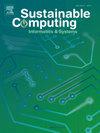提高能源社区的经济和环境绩效:利用山瞪羚优化器的多目标优化方法
IF 5.7
3区 计算机科学
Q1 COMPUTER SCIENCE, HARDWARE & ARCHITECTURE
引用次数: 0
摘要
本研究探讨了能源社区的三种不同配置,即利用可再生电能和热能的当地消费者群体。该研究旨在提高经济效益,同时通过先进的战略应对气候变化和满足能源需求。优化框架的重点是改进能源转换和存储系统的设计、容量和效率,在整个生命周期内平衡投资和运营成本与温室气体排放(GhGE)。介绍了两种创新的需求侧管理(DSM)策略:下游基于定价的需求响应计划(DRP)和上游需求侧管理模型,将电力需求与当地可用的可再生能源相结合。该研究采用一种多目标建模方法,将模糊理论与Pareto优化相结合,以实现成本和排放的最小化。结果表明,提出的DSM策略有显著的好处。DSM 2将个体产消者(IP)的自耗率提高了约17 %,能源社区的自耗率提高了14-17 %,而DSM 1有效地将产消者的电网交换率降低了9 %,能源社区的电网交换率降低了17 %。优化框架还有助于更平衡的发电和需求分布,减轻电网压力。这些发现强调了综合DSM策略和多目标优化在提高可再生能源系统性能和可持续性方面的潜力,在自我消费和电网交互方面提供了多种优势。本文章由计算机程序翻译,如有差异,请以英文原文为准。
Enhancing economic and environmental performance of energy communities: A multi-objective optimization approach with mountain gazelle optimizer
This research explores three distinct configurations of energy communities, collectives of local consumers utilizing renewable electrical and thermal energy. The study aims to enhance economic outcomes while addressing climate change and meeting energy demands through advanced strategies. The optimization framework focuses on refining the design, capacity, and efficiency of energy conversion and storage systems, balancing investment and operational costs with greenhouse gas emissions (GhGE) across their lifecycle. Two innovative demand-side management (DSM) strategies are introduced: a downstream pricing-based demand response program (DRP) and an upstream DSM model aligning electricity demand with locally available renewable energy. The study employs a multi-objective modeling approach using the novel mountain gazelle optimizer (MGO), which integrates fuzzy theory and Pareto optimization to minimize costs and emissions. Results demonstrate significant benefits of the proposed DSM strategies. DSM 2 enhances self-consumption rates by approximately 17 % for individual prosumers (IP) and 14–17 % for energy communities, while DSM 1 effectively reduces grid exchanges by 9 % for prosumers and up to 17 % for energy communities. The optimization framework also facilitates a more balanced distribution of generation and demand, alleviating grid stress. These findings underscore the potential of integrated DSM strategies and multi-objective optimization in advancing the performance and sustainability of renewable energy systems, offering diverse advantages in self-consumption and grid interaction.
求助全文
通过发布文献求助,成功后即可免费获取论文全文。
去求助
来源期刊

Sustainable Computing-Informatics & Systems
COMPUTER SCIENCE, HARDWARE & ARCHITECTUREC-COMPUTER SCIENCE, INFORMATION SYSTEMS
CiteScore
10.70
自引率
4.40%
发文量
142
期刊介绍:
Sustainable computing is a rapidly expanding research area spanning the fields of computer science and engineering, electrical engineering as well as other engineering disciplines. The aim of Sustainable Computing: Informatics and Systems (SUSCOM) is to publish the myriad research findings related to energy-aware and thermal-aware management of computing resource. Equally important is a spectrum of related research issues such as applications of computing that can have ecological and societal impacts. SUSCOM publishes original and timely research papers and survey articles in current areas of power, energy, temperature, and environment related research areas of current importance to readers. SUSCOM has an editorial board comprising prominent researchers from around the world and selects competitively evaluated peer-reviewed papers.
 求助内容:
求助内容: 应助结果提醒方式:
应助结果提醒方式:


